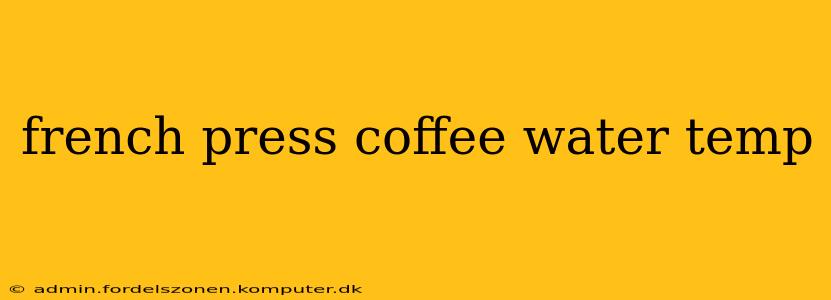The quest for the perfect cup of French press coffee often hinges on one crucial element: water temperature. Getting it right unlocks a world of nuanced flavor and aroma, while getting it wrong can result in a bitter, astringent, or otherwise unpleasant brew. This guide will explore the ideal water temperature for French press coffee and answer some frequently asked questions to help you master this classic brewing method.
What is the Ideal Water Temperature for French Press Coffee?
The sweet spot for French press coffee water temperature lies between 195°F (90°C) and 205°F (96°C). This range allows for optimal extraction of the coffee's desirable compounds, resulting in a rich, full-bodied cup without excessive bitterness. Going too low will result in under-extraction, a weak and sour brew. Going too high will over-extract, leading to a bitter and harsh taste.
Why is Water Temperature so Important in French Press Brewing?
French press brewing is a relatively gentle process compared to other methods like espresso. The longer immersion time of the grounds in the hot water requires careful temperature control to prevent over-extraction. Different temperature ranges extract different flavor compounds from the coffee beans. Lower temperatures will preferentially extract more acidic compounds, giving a sour taste. Higher temperatures extract more bitter compounds. Finding the perfect balance is key.
What Happens if the Water is Too Hot?
Using water that's too hot (above 205°F) will scorch the coffee grounds, leading to a bitter and burnt taste. This also increases the likelihood of extracting undesirable compounds, resulting in a harsh and unpleasant cup. The delicate flavors and aromas of your beans will be masked by this bitterness.
What Happens if the Water is Too Cold?
Using water that's too cold (below 195°F) will result in under-extraction. This means that many of the desirable flavor compounds will not be extracted from the grounds, leading to a weak, sour, and thin brew. The coffee will lack body and overall complexity.
How Can I Accurately Measure Water Temperature?
Investing in a reliable thermometer is crucial for consistent French press brewing. Digital thermometers provide instant and accurate readings, ensuring you consistently hit the ideal temperature range. Thermometers designed specifically for coffee brewing are readily available online and in specialty kitchen stores.
Does the Type of Coffee Bean Affect the Ideal Water Temperature?
While the ideal range remains consistent, the specific temperature within that range might be slightly adjusted based on the roast level of your coffee beans. Darker roasts, which are often naturally more bitter, might benefit from slightly lower temperatures (closer to 195°F). Lighter roasts, which tend to be more acidic, might benefit from slightly higher temperatures (closer to 205°F). This is a matter of personal preference and experimentation. Experiment to find what works best with your favorite beans.
Can I Use Boiling Water for French Press Coffee?
While boiling water (212°F) might seem like the obvious choice, it's generally recommended to allow the water to cool slightly before brewing. Let the water sit for a minute or two after boiling to reach the ideal temperature range. This prevents scorching the grounds and ensures a smoother, more balanced cup.
How Does Water Temperature Impact Coffee Extraction?
Water temperature directly impacts the rate at which soluble compounds are extracted from the coffee grounds. Hotter water extracts compounds more rapidly, while cooler water extracts them more slowly. This rate of extraction is crucial in achieving the desired balance of flavors and aromas in your French press coffee. The optimal temperature ensures a balanced extraction, preventing both under-extraction and over-extraction.
By carefully controlling the water temperature, you'll elevate your French press coffee experience, unlocking the full potential of your chosen beans and consistently enjoying a delicious and flavorful cup. Remember, precision and practice are key to mastering this brewing method.
